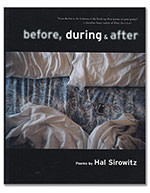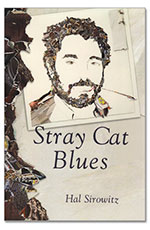Books
“Hal Sirowitz’s poems are wildly funny with an aftertaste of heartache—radiantly clear but haunted by the unspoken. His compressed plots unfold in the subconscious at warp speed. Beautifully grounded in specifics, this is transcendent poetry.” —D. Nurkse
Mother Said

Buy on Amazon or IndieBound
For anyone who has ever had a mother-and that includes most of us- or is a mother (one way or another), Hal Sirowitz’s poetry speaks the truth. About families, about relationships. Written in mother vernacular, these poems have the ring of adult nursery rhyme, with a tinge of horror and a ton of humor. Sirowitz’s poems are deceptively simple, achingly familiar, brutally funny.
“Like the black box from a plane crash, the larynx of a mother is indestructible and immortal. Hal Sirowitz takes an unsparing look at Mommy’s larynx in all its carping, oracular glory. It’s sly, sad, and very funny.” —Mark Leyner
Chopped-Off Arm
Don’t stick your arm out the window,
Mother said. Another car can sneak up
behind us, & chop it off. Then your father
will have to stop, stick the severed piece
in the trunk, & drive you to the hospital.
It’s not like the parts of your telescope that
snap back on. A doctor will have to sew it.
You won’t be able to wear short sleeves.
You won’t want anyone to see the stitches.

Buy on Amazon or IndieBound.
My Therapist Said
These poems have the same deadpan hysteria and ring of truth to them as Hal’s Mother Said poems. My Therapist Said is full of advice, some of it sage, some of it absurd. It makes sense this book would be the second one since Hal’s therapist becomes a second mother, joining in the chorus of advice. Garrison Keillor has read many poems from this collection on NPR’s The Writer’s Almanac (including “Lending Out Books,” below), and “I Finally Managed to Speak to Her” was featured on New York City buses and subways as part of the Poetry in Motion series, in connection with the Poetry Society of America.
“[Sirowitz’s] poems map the tangled terrain of the American family—its complex relationships, its twisted fears, its desperate dreams. They’re short and concise, but they can be sad, disturbing, and funny all at once: the emotional debris of an entire dysfunctional life packed into each one.” —Details
Lending Out Books
You’re always giving, my therapist said.
You have to learn how to take. Whenever
you meet a woman, the first thing you do
is lend her your books. You think she’ll
have to see you again in order to return them.
But what happens is, she doesn’t have the time
to read them, & she’s afraid if she sees you again
you’ll expect her to talk about them, & will
want to lend her even more. So she
cancels the date. You end up losing
a lot of books. You should borrow hers.

Buy on Amazon or IndieBound
Before, During & After
Before, During & After is all about the one word its title leaves out: sex. Hal shares the ups and downs of his romantic history from adolescence to adulthood and lets his girlfriends do most of the talking—the one with the perfect ass, the one who still lives with her ex, the one who demands a signed statement from his therapist, the celibate, the one who gives his penis a Spanish name, and all the rest. Sometimes Hal strikes out, sometimes he gets lucky, but he kisses and tells in the inimitable Sirowitz style that has inspired hilarity and Hal-O-Mania from New York to Norway.
“Hal Sirowitz has found a language to express the dumbfounded pause that occurs between two people when they are confusing one another about important matters. Whether between two lovers, or a son and a mother, that pause is like a physical space. Sirowitz has made it his project to translate that space into words. He keeps shooting them out relentlessly, in different configurations, often with haiku-like brevity, and these configurations are always imbued with the comedy and sadness of hope.” —Thomas Beller, author of J.D. Salinger: The Escape Artist; The Sleep-Over Artist; Seduction Theory, and creator of the website MrBellersNeighborhood.com.
Down by the Sea
When I was young I thought the condoms
I found on the beach, she said, were
dead jellyfish. When I brought them home
my mother took one look at them
& threw them out. I wasn’t allowed
to go to the ocean by myself anymore.
She was afraid of what it could show me.

Buy on Amazon or IndieBound
Father Said
Sirowitz creates a wonderfully funny and tender portrait of dear old Dad, from childhood memories to his death from cancer. Fathers, mothers, and their sons & daughters everywhere will recognize something of themselves in the Sirowitz family—and while they laugh at the arguments and nagging, they will also feel the love and familial affection running through these poems.
“Hal Sirowitz’s poems are indelible because they’re incredibly funny, totally genuine, and because they’re rooted in a complicated sympathy for the ambitions of the American family. This book will make you laugh out loud at the truth.” —Rick Moody
The Absence of Light
God works in mysterious ways, Father said.
But he’s not half as mysterious as your mother.
He said, Let there be light. And there was light.
I don’t see anything mysterious about that.
He did what He said He’d do.
Your mother says, Let’s not be late for the movie.
Yet she takes so long getting dressed
that it doesn’t pay to go. Then she
gets mad that I don’t take her any place.
God created light where there was only darkness.
She only creates confusion.

Buy on Amazon or IndieBound
Stray Cat Blues
This book was the winner of the 2013 Nebraska Book Award for Poetry. Hal expands his vision with longer poems in this collection. He includes historical poems as well as reflections on ordinary life. He ventures into new territory, writing about Parkinson’s Disease while still retaining his humor. He continues to mix humor with tragedy. You don’t know whether to laugh or cry.
“If one reads enough Hal Sirowitz poems, the whole world seems to become material for poetry. That is part of the gift of his work…. Sirowitz’s poetry is a celebration of ordinary life, and in its own way may signal the most radical democratization of poetry since the work of Whitman first appeared.” —Liz Rosenberg, from The Hollins Critic.
A Step Above Cows
I read somewhere that a cow
can only walk up stairs but
not down. Even though I have
Parkinson’s, I’m a step ahead
of a cow. I can walk up or down
without much trouble. And the
one time I fell, I was walking up
but lost my balance and fell down,
which proves that I’m not
a cow, because for a split second,
I had the choice of where to fall—
up or down—and unceremoniously
took the down route, because it
takes you faster to where you
want to go—at the beginning
of the stairs, so I could do it right this time.
